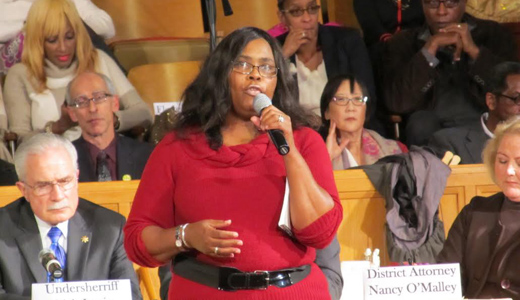
OAKLAND, Calif. – Ending the longstanding reality of unpunished police violence against black and brown men was the topic Dec. 17 at a town hall meeting that drew people from all over Oakland and nearby communities.
People of all ages, mostly African American but including all races, packed the pews and spilled over into the choir loft at north Oakland’s Beebe Memorial Cathedral, at the gathering organized by Black Elected Officials and Faith-Based Leaders of the East Bay.
While the nationally-known names of Michael Brown and Eric Garner were woven throughout the presentations, speakers also recalled with grief their friends and family members who had met with violence at the hands of police.
Listening intently were area elected officials, government administrators, and some police officials.
A theme that came up often, as dozens of audience members spoke, was the need for police to interact with and really get to know the people in the communities they serve.
“When we talk about community-police interaction, we understand that especially our African American and brown young men are scared of police, and we also understand that some police are scared of the citizens they meet,” Wanda Johnson told the crowd.
Johnson’s son, Oscar Grant, was fatally shot by a Bay Area Rapid Transit police officer on New Year’s Day 2009, just weeks before his 23rd birthday.
Police need to live in the communities they serve, “so they know how to react when situations occur,” Johnson said. “Take off the uniforms sometimes, come to some of the events, talk with the people and get to know them.”
A number of speakers called for restorative justice programs, where everyone involved discusses what happened, how to keep it from happening again, how the offender can address the damage, and together make a plan that community members can make sure is carried out.
“The solution I put forth today is that we come together and we do what we say needs to happen in any relationship that needs to heal,” said one woman. “We begin the dialogues, we talk, and we take on restorative justice conversations that are already going forward, and we start to have them all over this city.” She urged faith-based organizations to host such dialogues between law enforcement and the community, “and let’s talk, let’s start to heal.”
Another woman put it differently: “As adults we always think we have the solution and we don’t stop to hear what the youth want us to do.” She called for restorative justice circles with law enforcement, community members, teachers, youth, and young adults, in all Oakland public schools.
Many speakers called for an end to the practice of supplying police departments with military weaponry.
Oscar Grant’s uncle, Cephus Johnson, put the issue in a broader context as he sharply criticized huge military spending generally, including the wars in Iraq and Afghanistan, and related it to the pervasive and growing militarization of police departments.
Pointing out that in 2012, Oakland taxpayers paid nearly $1 billion toward the Pentagon budget, he urged that the funds be used instead for education including early childhood education, child health care and other social needs.
“We are in a state of emergency,” Cephus Johnson said. “The very foundation of society right now is resting on this racist criminal justice system. It’s the backbone of society. And this system in its entirety must be dismantled and restructured so black folks, brown folks, those who believe in true justice can really see justice.”
Still others took out after local media for demonizing victims of police violence and peaceful protesters.
While most of the evening was devoted to hearing from the audience, some time was left for responses by elected officials.
U.S. representative Barbara Lee, who represents Oakland and surrounding communities, called on audience members to help fight for Congressional passage of six bills she is working on, to support police accountability and grand jury reform, end racial profiling and police militarization, and increase funds for a variety of social needs programs.
“We’re going to need all of you, to make those changes,” she told the crowd. “Fifty years ago, change did not come from within, it came from outside, it was the protests and the young people” that made the difference.
In closing remarks, meeting chair Keith Carson, president of the Alameda County Board of Supervisors, emphasized that the town hall was just the first of many such discussions.
Photo: Wanda Johnson, mother of victim Oscar Grant, addresses the audience. Marilyn Bechtel/PW












Comments